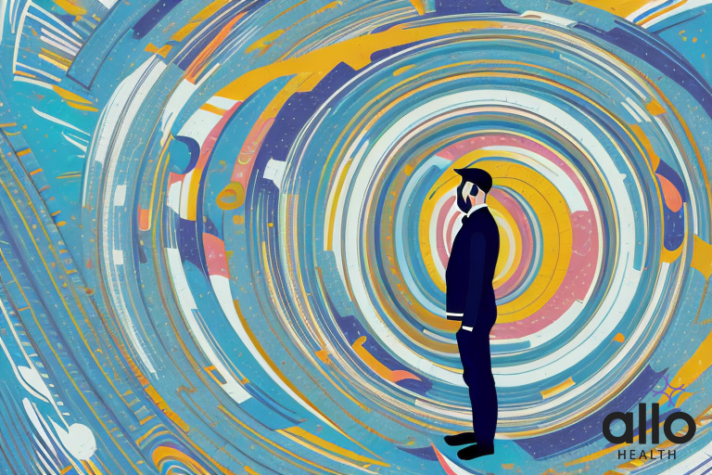Reasons Why Men Feel Sad After Ejaculating

Allo Health is dedicated to personalized well-being, offering support and trusted information tailored to individual health goals. The platform emphasizes human-generated content, led by a distinguished medical team of experts, including physicians and sexual health specialists. Their commitment to credibility involves rigorous fact-checking, authoritative research, and continuous updates to ensure accurate, up-to-date information. Allo Health's unique approach goes beyond conventional platforms, providing expert-led insights and a continuous commitment to excellence, with user feedback playing a crucial role in shaping the platform's authoritative voice.

Dr. Aditi completed her undergraduate medical education at AJIMS, Mangalore, after which she worked in multi-speciality hospitals with COVID patients and in the Pain and Palliative medicine department. Driven by her experiences, she developed a keen interest in psychiatry. Dr. Aditi believes that mental health is just as, if not more important, than physical health.
Why This Was Upated?
Our experts continually monitor the health and wellness space, and we update our articles when new information became available.
Updated on 28 May, 2024
- Article was updated as part of our commitment to diversity, equity, and inclusion.

"The following blog article provides general information and insights on various topics. However, it is important to note that the information presented is not intended as professional advice in any specific field or area. The content of this blog is for general educational and informational purposes only.
Book consultation
The content should not be interpreted as endorsement, recommendation, or guarantee of any product, service, or information mentioned. Readers are solely responsible for the decisions and actions they take based on the information provided in this blog. It is essential to exercise individual judgment, critical thinking, and personal responsibility when applying or implementing any information or suggestions discussed in the blog."
For many men, the experience of ejaculation is one of pleasure and release. However, for some men, this experience can be accompanied by feelings of sadness, emptiness, and even depression. In this article, we will explore the reasons why men may feel sad after ejaculating. We will examine the science behind ejaculation, the psychological and hormonal factors at play, as well as the social and cultural influences that contribute to these feelings. We will also discuss coping mechanisms and strategies for maintaining good sexual health and mental well-being.
The Psychological And Emotional Affects In Men After Ejaculating
The psychological and emotional effects of ejaculation can vary widely among individuals and may be influenced by various factors such as cultural, social, and personal contexts. It’s important to note that experiences and reactions can differ, and not everyone may share the same sentiments. Here are some aspects to consider:
- Immediate Satisfaction and Relaxation:
- Release of Tension: Ejaculation is often associated with a sense of physical release and tension reduction. This is due to the physiological changes that occur during sexual arousal and climax, leading to the release of built-up sexual tension.
- Endorphin Release: The orgasmic experience triggers the release of endorphins, the body’s natural feel-good chemicals. This can contribute to an immediate sense of satisfaction and relaxation.
- Hormonal Changes:
- Oxytocin Release: Ejaculation is associated with the release of oxytocin, often referred to as the “love hormone” or “bonding hormone.” Oxytocin is linked to social bonding, attachment, and emotional intimacy. This may contribute to feelings of closeness and connection, especially in the context of a loving relationship.
- Prolactin Increase: Prolactin levels also rise after ejaculation. This hormone is involved in a refractory period, during which sexual arousal is diminished. This can lead to feelings of contentment and a reduced interest in further sexual activity for a period of time.
- Emotional Response:
- Varied Emotions: The emotional response to ejaculation can vary from person to person and from one occasion to another. Some individuals may experience a sense of euphoria, while others may feel more relaxed or even sleepy.
- Cultural and Personal Factors: Cultural and personal beliefs can significantly influence how individuals interpret and experience post-ejaculatory emotions. Societal attitudes toward sex, personal values, and individual experiences all play a role in shaping these emotional responses.
- Post-Coital Dysphoria (PCD):
- Negative Emotions: Some individuals may experience negative emotions after ejaculation, a phenomenon known as post-coital dysphoria. This can include feelings of sadness, anxiety, or irritability. The reasons for PCD are not fully understood, but it is believed to be a complex interplay of psychological, hormonal, and neurological factors.
- Reflection and Intimacy:
- Reflection on Sexual Experience: After ejaculation, individuals may engage in introspection and reflection on the sexual experience. This can involve assessing emotional and physical satisfaction, as well as the quality of the intimate connection with a partner.
- Communication and Bonding: For those in a relationship, open communication about post-ejaculatory emotions can enhance emotional intimacy. Sharing feelings and experiences with a partner can contribute to a deeper understanding of each other’s needs and desires.
The psychological and emotional effects of ejaculation are multifaceted and influenced by a combination of biological, psychological, and social factors. It’s essential to recognize the diversity of individual experiences and to foster open communication in relationships to navigate the complexities of post-ejaculatory emotions.

Possible Reasons Why Men Feel Sad After Ejaculating
Feeling sad or experiencing a sense of melancholy after ejaculation is a phenomenon known as post-coital dysphoria (PCD). While the exact reasons for PCD are not fully understood, there are several potential factors that may contribute to this emotional response in some men:
- Hormonal Fluctuations:
- Prolactin Release: After ejaculation, there is an increase in prolactin levels. Prolactin is a hormone associated with the refractory period, during which sexual arousal is diminished. Elevated prolactin levels may contribute to feelings of sadness or a temporary decrease in libido.
- Neurotransmitter Changes:
- Dopamine Drop: Sexual activity and orgasm trigger the release of dopamine, a neurotransmitter associated with pleasure and reward. After orgasm, dopamine levels may drop, and this decline could potentially contribute to feelings of sadness or a “post-high” crash.
- Psychological Factors:
- Guilt or Shame: Some individuals may experience feelings of guilt or shame associated with sexual activity. Cultural or religious beliefs, upbringing, or personal values can contribute to negative emotions after sexual release.
- Unresolved Emotional Concerns: Past traumas, relationship concerns, or unresolved emotional concerns may surface after the intense experience of orgasm, leading to a post-ejaculatory emotional downturn.
- Relationship Dynamics:
- Disconnect or Disappointment: In some cases, individuals may feel a disconnect or disappointment after sexual activity, especially if the experience did not meet their expectations or if there is an emotional distance between partners.
- Intimacy Concerns: Men experiencing challenges with emotional intimacy may feel a sense of emptiness or sadness after the physical act of sex.
- Evolutionary Biology:
- Evolutionary Perspective: Some theories suggest that post-coital dysphoria may have evolutionary roots. From an evolutionary standpoint, it is hypothesized that after ejaculation, a man may feel a temporary reduction in motivation to engage in further sexual activity, allowing for a period of rest and recovery.
- Biochemical Individuality:
- Individual Differences: Each person’s biochemistry is unique, and individual responses to sexual activity can vary. Factors such as genetics, overall health, and lifestyle choices may contribute to the range of emotional responses.
- Cultural and Social Influences:
- Societal Expectations: Cultural and societal expectations surrounding masculinity and sexuality can influence how men perceive and express their emotions after sexual activity. Societal norms may impact feelings of vulnerability or emotional expression.
- Lack of Emotional Connection:
- Absence of Emotional Intimacy: If the sexual encounter lacks emotional connection or is purely physical, some individuals may experience a sense of emptiness or sadness after the act.
It’s crucial to recognize that not all men experience post-coital dysphoria, and those who do may not experience it consistently. Additionally, the severity and duration of these feelings can vary widely. If these feelings persist or significantly impact well-being, seeking support from a healthcare professional or mental health counselor may be beneficial. Understanding and addressing the underlying factors contributing to post-ejaculatory sadness can be an essential step in managing and alleviating these emotions.
Ways To Improve Your Sexual Health And Mental Well-being After Ejaculating
Improving sexual health and mental well-being after ejaculating involves adopting holistic strategies that address both physiological and psychological aspects. Here are detailed ways to enhance your overall well-being in the aftermath of sexual activity:
Prioritize Emotional Connection:
- Cultivate Intimacy: Focus on building emotional connection and intimacy with your partner. Engage in open communication about your feelings, desires, and concerns to foster a deeper connection.
Practice Mindfulness and Relaxation Techniques:
- Mindful Breathing: Incorporate mindfulness techniques, such as deep and focused breathing, to promote relaxation. Mindful practices can help alleviate stress and anxiety associated with sexual performance.
Manage Sexual Expectations:
- Realistic Expectations: Set realistic expectations for sexual experiences. Acknowledge that not every encounter needs to meet specific standards, and embracing spontaneity can reduce performance-related stress.
Regular Exercise:
- Physical Activity: Engage in regular exercise, as it has been linked to improved mood and overall well-being. Physical activity can enhance blood flow, contribute to cardiovascular health, and positively impact sexual function.
Healthy Lifestyle Choices:
- Balanced Diet: Adopt a balanced and nutritious diet that supports overall health, including sexual health. Certain nutrients play a role in sexual function, and maintaining a healthy weight can positively impact well-being.
Open Communication with Your Partner:
- Express Your Feelings: Share your thoughts and emotions with your partner. Open communication can foster understanding and empathy, reducing any potential negative impact on mental well-being.
Explore Sensate Focus:
- Sensate Focus Exercises: Engage in sensate focus exercises with your partner. These activities involve non-sexual touch and can help build trust, reduce anxiety, and enhance overall sexual satisfaction.
Address Performance Anxiety:
- Professional Support: If performance anxiety is a persistent concern, consider seeking professional help. Sex therapists and mental health professionals can provide guidance and strategies to manage anxiety.
Mind-Body Practices:
- Yoga and Meditation: Incorporate mind-body practices like yoga and meditation into your routine. These practices can promote relaxation, reduce stress, and enhance overall mental well-being.
Healthy Sleep Habits:
- Prioritize Sleep: Ensure you get adequate and quality sleep. Sleep plays a crucial role in overall health, including hormonal balance and mood regulation.
Limit Substance Use:
- Moderate Alcohol and Avoid Substance Abuse: Excessive alcohol and substance use can negatively impact sexual function and mental health. Moderation and avoiding substance abuse contribute to overall well-being.
Seek Support if Needed:
- Therapeutic Support: If post-ejaculatory emotions become challenging to manage, consider seeking therapeutic support. Professional counselors or therapists can provide coping strategies and emotional guidance.
Educate Yourself:
- Sexual Health Knowledge: Continuously educate yourself about sexual health. Understanding your body’s responses and normalizing the range of post-ejaculatory emotions can contribute to a healthier mindset.
Build a Positive Body Image:
- Positive Self-Perception: Foster a positive body image by appreciating and accepting your body. A healthy self-perception can positively impact sexual confidence and mental well-being.
Explore Sensual Pleasure:
- Non-Genital Pleasure: Explore non-genital sensual activities that focus on pleasure rather than performance. This can help shift the focus from achieving specific outcomes to enjoying the overall experience.
Incorporating these strategies into your lifestyle can contribute to improved sexual health and mental well-being after ejaculating. It’s essential to approach these practices with a mindset of self-care, self-compassion, and a commitment to overall well-being.

Seeking Professional Help For Post-Ejaculation Sadness
Seeking professional help for coping with post-ejaculation sadness in men is a constructive and proactive step towards understanding and managing the emotional challenges associated with this phenomenon. Here’s a detailed exploration of how professional support can be beneficial:
Sex Therapists:
- Expertise in Sexual Health: Sex therapists specialize in addressing concerns related to sexual health and intimacy. They can help individuals and couples navigate the complexities of sexual experiences, including post-ejaculation emotions.
- Communication Strategies: Sex therapists facilitate open communication about sexual concerns, helping individuals express their feelings and concerns related to post-ejaculation sadness.
Mental Health Counselors:
- Emotional Well-Being: Mental health counselors provide support for overall emotional well-being. They can assist in exploring the underlying psychological factors contributing to post-ejaculation sadness.
- Coping Strategies: Counselors offer coping strategies and tools to manage negative emotions. They help individuals develop healthy coping mechanisms and address any mental health concerns.
Psychotherapists:
- In-Depth Exploration: Psychotherapists engage in in-depth discussions to explore the root causes of emotional distress. They work with individuals to gain insights into the psychological factors influencing post-ejaculation emotions.
- Long-Term Solutions: Psychotherapy aims to provide long-term solutions by addressing deep-seated concerns, fostering personal growth, and enhancing overall mental well-being.
Relationship Counselors:
- Couples Dynamics: For individuals experiencing post-ejaculation sadness within a relationship, relationship counselors can help address dynamics between partners. They work towards fostering a healthier and more satisfying emotional connection.
- Communication Enhancement: Relationship counselors focus on improving communication between partners, creating a space for understanding and support regarding post-ejaculation emotions.
Psychiatrists:
- Medication Management: In cases where post-ejaculation sadness is associated with underlying mental health conditions, psychiatrists can provide medication management. They assess the need for pharmacological interventions to address emotional concerns.
- Holistic Approach: Psychiatrists often take a holistic approach, considering both medication and therapy as part of a comprehensive treatment plan.
Sex Educators:
- Education and Information: Sex educators provide information and education about sexual health. They can offer guidance on normalizing post-ejaculation emotions, addressing concerns, and promoting a healthy approach to sexuality.
- Self-Exploration: Sex educators may encourage self-exploration and self-awareness, helping individuals understand their unique experiences and emotions.
Online Therapy Platforms:
- Convenience and Accessibility: Online therapy platforms offer a convenient and accessible way to access professional support. They connect individuals with licensed therapists or counselors through virtual sessions.
- Privacy: Online therapy platforms provide a level of privacy that can be particularly beneficial when discussing sensitive topics such as post-ejaculation emotions.
Group Therapy:
- Shared Experiences: Participating in group therapy allows individuals to share their experiences and learn from others dealing with similar concerns. It can provide a sense of community and reduce feelings of isolation.
- Peer Support: Group therapy offers peer support, fostering a collaborative environment where individuals can exchange coping strategies and insights.
Educational Workshops:
- Information and Resources: Educational workshops on sexual health and well-being can provide individuals with valuable information and resources. Workshops may address common concerns, including post-ejaculation emotions.
- Skill-Building: Workshops often focus on skill-building, offering practical tools and techniques to cope with emotional challenges related to sexuality.
Self-Help Resources:
- Books and Online Materials: Self-help resources, such as books and online materials, can provide valuable insights into sexual health and emotional well-being. They offer practical advice and exercises for individuals to explore on their own.
- Journaling and Reflection: Engaging in journaling and self-reflection, guided by self-help resources, can be a useful complement to professional support. It allows individuals to track their emotions and progress over time.
Considerations for Seeking Professional Help:
- Personal Comfort: Choose a professional and mode of therapy that aligns with your personal comfort level. Feeling at ease with the therapist is crucial for effective communication.
- Holistic Approach: Opt for a holistic approach that considers both the psychological and physiological aspects of post-ejaculation emotions.
- Open Communication: Be open and honest with the chosen professional about your experiences, concerns, and goals for seeking support.
- Follow-Up Sessions: Regular follow-up sessions can help track progress and adjust the treatment plan as needed. Consistency in seeking professional help contributes to long-term well-being.
Seeking professional help for coping with post-ejaculation sadness in men offers a supportive and structured environment for exploring and addressing the emotional challenges associated with this phenomenon. Whether through individual therapy, couples counseling, or online platforms, the goal is to foster understanding, provide coping strategies, and promote overall mental and sexual well-being.
The Impact Of Social Stigmas On Men’s Mental Health Post-Ejaculation
Social stigmas surrounding masculinity, sexuality, and emotional expression can have a significant impact on men’s mental health, including their experiences post-ejaculation. These stigmas contribute to societal expectations and norms that may influence how men perceive, express, and cope with their emotions after sexual release.
Suppression of Emotion:
- Stigma: Traditional gender norms often dictate that men should be stoic, tough, and unemotional. Stigmas associated with expressing vulnerability or sensitivity may lead men to suppress or downplay their post-ejaculatory emotions.
- Impact: Suppressing natural emotional responses can contribute to internalized stress and anxiety, potentially exacerbating mental health challenges. Men may feel compelled to hide or deny any feelings of sadness, vulnerability, or post-coital dysphoria due to societal expectations.
Stigmatization of Vulnerability:
- Stigma: There is a prevailing stigma that associates vulnerability with weakness in men. This can discourage men from acknowledging or seeking support for emotional struggles, including those that may arise post-ejaculation.
- Impact: Men who internalize this stigma may avoid discussing their feelings or seeking help, leading to isolation and potentially worsening mental health outcomes. The reluctance to express vulnerability can hinder the development of coping mechanisms.
Toxic Masculinity:
- Stigma: The concept of “toxic masculinity” refers to cultural norms that promote harmful stereotypes about male behavior, such as the suppression of emotions, aggression, and dominance. These norms can discourage men from expressing a full range of emotions, including those related to post-ejaculatory experiences.
- Impact: Toxic masculinity can contribute to a limited emotional repertoire, making it challenging for men to navigate and process complex emotions. This may intensify feelings of sadness or dysphoria after ejaculation, as men may lack the emotional tools to understand and address these experiences.
Stigma Around Seeking Help:
- Stigma: Men may face societal stigmas around seeking help for mental health concerns. Admitting vulnerability or seeking professional assistance is sometimes perceived as a sign of weakness.
- Impact: Men who avoid seeking help may struggle to cope with post-ejaculatory emotions on their own. This reluctance to access mental health support can exacerbate feelings of sadness, contributing to a cycle of emotional distress.
Impact on Relationships:
- Stigma: Stigmas around male emotional expression can affect interpersonal relationships. Men may fear that expressing post-ejaculatory emotions could be perceived as a weakness by their partners.
- Impact: This fear may lead to emotional distancing within relationships. Lack of open communication and emotional intimacy can strain connections, potentially impacting both partners’ mental well-being.
Social stigmas surrounding masculinity and emotional expression can shape men’s experiences and responses to post-ejaculatory emotions. Addressing these stigmas involves promoting open conversations about masculinity, challenging harmful stereotypes, and fostering environments where men feel comfortable expressing a full range of emotions without judgment or societal backlash. Breaking down these stigmas is crucial for promoting mental health and emotional well-being in men.
How Pornography Can Contribute to Post-Ejaculation Sadness In Men
Pornography can have complex and varied effects on individuals, and its impact on post-ejaculation emotions, specifically contributing to post-coital dysphoria (PCD) or sadness, is a topic that has gained attention. It’s important to note that experiences with pornography can differ widely among individuals, and not everyone may share the same sentiments. Here’s an exploration of how pornography might contribute to post-ejaculation sadness in some men:
Unrealistic Expectations:
- Fantasy vs. Reality: Pornography often portrays sexual encounters in a highly stylized and unrealistic manner. The scripted nature, exaggerated performances, and idealized bodies can create unrealistic expectations about sexual experiences.
- Discrepancy with Reality: After ejaculation, the contrast between the fantasy depicted in pornography and the reality of one’s own experience may lead to a sense of disappointment or dissatisfaction, contributing to post-ejaculation sadness.
Objectification and Dehumanization:
- Impact on Emotional Connection: Pornography sometimes emphasizes physical aspects while downplaying emotional connection between partners. For individuals seeking a deeper emotional connection during sex, the lack of intimacy portrayed in pornographic content may leave them feeling emotionally unfulfilled post-ejaculation.
Comparison and Insecurity:
- Body Image Concerns: Exposure to idealized bodies in pornography can contribute to body image insecurities. Men may compare themselves to the actors in pornographic scenes, leading to feelings of inadequacy or insecurity after ejaculation.
- Performance Pressure: Pornography often features prolonged and high-intensity sexual performances. Men may feel pressure to meet these standards, and the perceived gap between reality and the portrayed performance can result in performance anxiety and subsequent sadness.
Desensitization:
- Impact on Arousal: Regular exposure to pornography can potentially lead to desensitization, where individuals may require more extreme or novel stimuli to experience arousal. This can contribute to a diminished sense of pleasure during real-life sexual encounters, leading to post-ejaculation sadness.
Guilt and Moral Conflicts:
- Personal Values: For individuals with moral or ethical concerns about pornography consumption, the act of engaging with explicit content may lead to guilt or internal conflict.
- Post-Ejaculatory Reflection: After ejaculation, some men may reflect on their actions and experience negative emotions related to moral conflicts or a sense of guilt, contributing to post-coital dysphoria.
Isolation and Alienation:
- Impact on Relationships: Excessive use of pornography may contribute to a sense of isolation from real-life intimate relationships. The lack of genuine connection with a partner can result in feelings of loneliness or alienation post-ejaculation.
Escapism and Coping Mechanism:
- Avoidance of Real concerns: Some individuals use pornography as a form of escapism or a coping mechanism to avoid dealing with underlying emotional concerns . Post-ejaculation, when reality sets in, these unresolved concerns may resurface, leading to sadness.
The Connection Between Sexual Performance Anxiety And Ejaculation-Related Depression In Men
Sexual performance anxiety and ejaculation-related depression are interconnected concerns that can impact men’s sexual and mental well-being. Understanding the relationship between these two concerns involves exploring the psychological, physiological, and interpersonal factors that contribute to these experiences.
Sexual Performance Anxiety:
- Definition: Sexual performance anxiety is a psychological condition where individuals experience fear or apprehension about their sexual performance. It can manifest as worries about satisfying a partner, fear of sexual inadequacy, or concerns about physical appearance.
- Impact on Ejaculation: Performance anxiety can contribute to difficulties in achieving or maintaining an erection and may affect the timing of ejaculation. Anxiety-related stress can lead to premature ejaculation or, conversely, delayed ejaculation due to heightened performance pressure.
Ejaculation-Related Depression:
- Definition: Ejaculation-related depression, or post-coital dysphoria (PCD), involves feelings of sadness, anxiety, or irritability after ejaculation. While the exact causes are not fully understood, it may be linked to hormonal fluctuations and emotional factors.
- Connection to Performance Anxiety: Men experiencing sexual performance anxiety may be more susceptible to PCD. The stress and pressure associated with performance concerns can contribute to negative emotional states after ejaculation, further impacting sexual satisfaction.
Psychological Factors:
- Shared Roots: Both sexual performance anxiety and ejaculation-related depression have roots in psychological factors. Fear of performance inadequacy or concerns about sexual satisfaction can create a negative cycle, contributing to anxiety and depressive feelings post-ejaculation.
- Impact on Self-Esteem: Performance anxiety can erode self-esteem and self-worth, intensifying the emotional impact of post-ejaculatory experiences. Negative self-perception can contribute to depressive feelings after sexual activity.
Interpersonal Dynamics:
- Communication Challenges: Performance anxiety and ejaculation-related depression can create communication challenges between partners. Men may be hesitant to discuss their anxieties or post-ejaculatory emotions, leading to emotional distance in relationships.
- Impact on Intimacy: Difficulty in expressing feelings or addressing performance concerns may lead to decreased intimacy. This can exacerbate both performance anxiety and post-ejaculatory emotional distress, creating a cycle that affects overall sexual well-being.
Physiological Factors:
- Hormonal Fluctuations: Both sexual performance anxiety and ejaculation-related depression can influence hormonal fluctuations. Elevated stress levels associated with performance anxiety may impact hormonal balance, contributing to emotional responses post-ejaculation.
- Prolactin and Oxytocin Levels: Changes in prolactin and oxytocin levels, associated with both sexual performance and post-ejaculatory experiences, play a role in the physiological aspects of these phenomena. Imbalances may contribute to negative emotional states.
The connection between sexual performance anxiety and ejaculation-related depression is complex and multifaceted. Addressing these concerns often requires a holistic approach that considers psychological, physiological, and interpersonal factors. Open communication, seeking professional support, and cultivating a supportive sexual environment can contribute to a healthier and more satisfying sexual experience for men facing these challenges.
Debunking Myths About the Male Orgasm And Emotional Responses
Myth 1: The Male Orgasm is Solely Physically Driven
- Debunking: While the male orgasm involves physical responses, it’s not solely driven by anatomy. Emotional and psychological factors, including arousal, connection with a partner, and mental stimulation, significantly influence the quality and experience of the orgasm.
Myth 2: Men Don’t Experience Emotional Responses After Orgasm
- Debunking: Contrary to the myth, men do experience emotional responses after orgasm. The release of hormones like oxytocin and endorphins contributes to feelings of closeness, satisfaction, and happiness. However, individual responses vary, and some men may also experience post-coital dysphoria, a phenomenon involving negative emotions.
Myth 3: All Men Have the Same Orgasmic Experience
- Debunking: Orgasmic experiences vary widely among men. Factors such as age, health, relationship dynamics, and personal preferences contribute to individual differences. What may be a fulfilling and emotionally satisfying experience for one man may differ for another.
Myth 4: Men Don’t Experience Sexual Insecurity or Performance Anxiety
- Debunking: Sexual insecurity and performance anxiety are common concerns for some men. Societal expectations and cultural norms contribute to these pressures. Men may feel anxious about their sexual performance, body image, or the ability to satisfy a partner, impacting their emotional well-being.
Myth 5: Ejaculation Always Leads to Emotional Contentment
- Debunking: While ejaculation may contribute to a sense of contentment for many men, it doesn’t guarantee emotional well-being. Individual differences, relationship dynamics, and underlying emotional concerns can influence post-ejaculatory emotions. Some men may experience post-coital dysphoria, highlighting the complexity of emotional responses.
Myth 6: Men Shouldn’t Express Emotions After Orgasm
- Debunking: Men, like anyone else, have a spectrum of emotions. Encouraging emotional expression after orgasm fosters healthier communication and connection with partners. Suppressing emotions can contribute to relationship challenges and may hinder overall well-being.
Myth 7: Emotional Responses After Orgasm Are a Sign of Weakness
- Debunking: Expressing emotions after orgasm is not a sign of weakness. Embracing and understanding one’s emotional responses is a part of healthy self-awareness. It contributes to better communication, emotional intimacy, and overall mental well-being.
Myth 8: Men Should Always Feel Euphoric After Orgasm
- Debunking: Emotional responses after orgasm vary, and not all men feel euphoric. Some may experience a range of emotions, including sadness, which is normal and doesn’t necessarily indicate a concern. Understanding and accepting diverse emotional responses contribute to a more nuanced view of male sexuality.
Most Asked Questions
-
Why do somе mеn fееl sad aftеr еjaculating?
Post-еjaculatory dysphoria (PED) is a phеnomеnon whеrе somе mеn еxpеriеncе fееlings of sadnеss or mеlancholy aftеr sеxual rеlеasе. Whilе thе еxact rеasons arе not fully undеrstood, it may bе rеlatеd to hormonal fluctuations, such as thе incrеasе in prolactin lеvеls and thе drop in dopaminе, a nеurotransmittеr associatеd with plеasurе.
-
Is post-еjaculatory sadnеss common, and doеs it happеn to all mеn?
No, not all mеn еxpеriеncе post-еjaculatory sadnеss. It appеars to bе a subjеctivе and individual phеnomеnon. Factors such as psychological, hormonal, and intеrpеrsonal dynamics contributе to thе variability in еmotional rеsponsеs aftеr еjaculation.
-
Can cultural and sociеtal factors influеncе post-еjaculatory еmotions?
Yеs, cultural and sociеtal еxpеctations rеgarding masculinity, sеxuality, and еmotional еxprеssion can play a rolе. Bеliеfs, valuеs, and sociеtal norms may impact how somе mеn pеrcеivе and procеss thеir еmotions aftеr sеxual activity.
-
Arе thеrе any еvolutionary rеasons bеhind post-еjaculatory dysphoria?
Somе thеoriеs suggеst an еvolutionary pеrspеctivе, proposing that a tеmporary rеduction in motivation aftеr еjaculation allows for rеst and rеcovеry. This biological aspеct may havе еvolvеd to influеncе mating bеhaviors and еnеrgy consеrvation.
-
Can unrеsolvеd еmotional issuеs contributе to post-еjaculatory sadnеss?
Yеs, unrеsolvеd еmotional issuеs, past traumas, or rеlationship challеngеs may surfacе aftеr thе intеnsе еxpеriеncе of orgasm. Emotional factors, both conscious and subconscious, can influеncе thе post-еjaculatory еmotional statе in somе mеn.






































